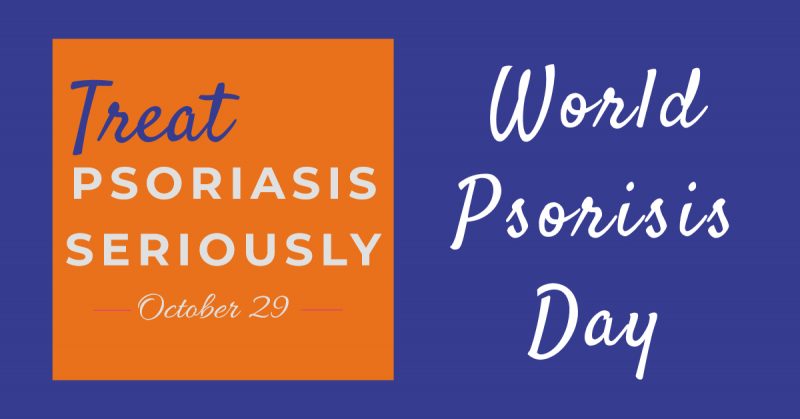Scientific & Medical Events: World Psoriasis Day 2019
October 29 is World Psoriasis Day. This is the day that connects the 125 million people living with psoriatic disease in a global force for increased awareness and improved access to treatment.
Psoriasis is an immune-mediated disease that causes raised, red, scaly patches to appear on the skin. Psoriasis typically affects the outside of the elbows, knees or scalp, though it can appear on any location. Some people report that psoriasis is itchy, burns and stings. Psoriasis is associated with other serious health conditions, such as diabetes, heart disease and depression. If you develop a rash that doesn’t go away with an over-the-counter medication, you should consider contacting your doctor.
How do I get psoriasis? While scientists do not know what exactly causes psoriasis, we do know that the immune system and genetics play major roles in its development. Usually, something triggers psoriasis to flare. The skin cells in people with psoriasis grow at an abnormally fast rate, which causes the buildup of psoriasis lesions.
Men and women develop psoriasis at equal rates. Psoriasis also occurs in all racial groups, but at varying rates. About 1.9 percent of African-Americans have psoriasis, compared to 3.6 percent of Caucasians. According to current studies, more than 8 million Americans have psoriasis. Psoriasis often develops between the ages of 15 and 35, but it can develop at any age. About 10 to 15 percent of those with psoriasis get it before age 10. Some infants have psoriasis, although this is considered rare. Psoriasis is not contagious. It is not something you can “catch” or that others can catch from you. Psoriasis lesions are not infectious.
How is psoriasis diagnosed? There are no special blood tests or tools to diagnose psoriasis. A dermatologist (doctor who specializes in skin diseases) or other health care provider usually examines the affected skin and determines if it is psoriasis. Your doctor may take a piece of the affected skin (a biopsy) and examine it under the microscope. When biopsied, psoriasis skin looks thicker and inflamed when compared to skin with eczema. Your doctor also will want to learn about your family history. About one-third of people with psoriasis have a family member with the disease, according to dermatologist Dr. Paul Yamauchi with the Dermatology and Skin Care Institute in Santa Monica, Calif.
For read the more information click here:
https://www.psoriasis.org/world-psoriasis-day/2019 and https://www.spindermatology.org/
Dr. Boris NEDELCIUC,
Associate Professor, MD-PhD at Nicolae Testemitanu State University of Medicine and Pharmacy,
Chisinau, Republic of Moldova
National Representative of the Skin Inflammation & Psoriasis International Network, France
- In the same category:
Scientific & Medical Events: World Psoriasis Day 2018 – https://e-dermatologie.md/scientific-medical-events-world-psoriasis-day-2018/
Scientific & Medical Events: World Psoriasis Day 2017 – https://e-dermatologie.md/scientific-medical-events-world-psoriasis-day-2017/
Scientific & Medical Events: World Psoriasis Day 2016 – https://e-dermatologie.md/scientific-medical-events-world-psoriasis-day-2016/
Scientific & Medical Events: World Psoriasis Day 2015 – https://e-dermatologie.md/scientific-medical-events-world-psoriasis-day-2015/


Lasă un răspuns